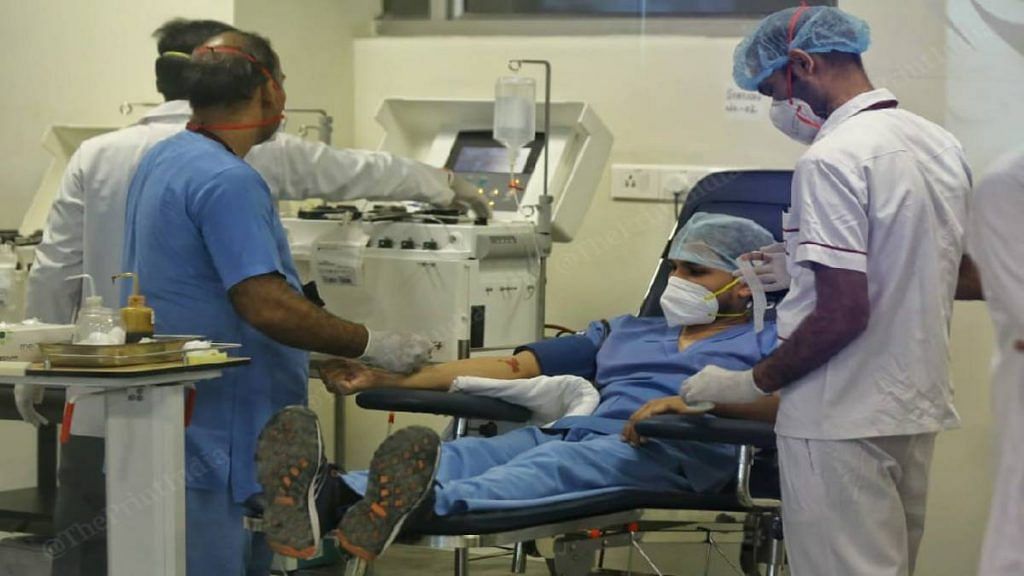New Delhi: A 37-year-old man in Delhi, who recovered from Covid-19 in April, has set a precedent for all to follow by donating plasma for six times.
Tabrej Khan, who was one of the organisers of a protest against the Citizenship Amendment Act in the capital’s Jahangirpuri area, has told the media that he plans to donate for the seventh time. This raises the question — how many times can a recovered person donate plasma?
Satyajit Rath, an immunologist at IISER in Pune, told ThePrint: “Keep in mind that we take only 10 per cent of the blood volume every time a person donates (plasma). So even after donating for a few times, a patient will continue to have antibodies in their blood.”
According to Dr Meenu Bajpai, the head of Blood Transfusion department at the Institute of Liver and Biliary Sciences (ILBS), where Khan donated his plasma for the first two times, “I have seen his antibody tests and his titre (concentration of antibodies) during his second donation was unusually high for a patient, who recovered in April.”
She said it is highly likely that Khan’s titre of antibodies must have continued to show good numbers, which is why he was able to donate plasma for six times.
“Usually, we look for patients who have recovered one or two months prior to the date of donation. So as of 31 July, we will look for patients who have recovered in April or June,” she added.
Convalescent plasma therapy or CPT involves transfusing blood from a recently recovered Covid-19 patient to another patient infected with the disease. Patients who have recovered from Covid-19 have antibodies in their blood, which could help others fight off the infection.
Therefore, the idea behind plasma therapy is to leverage the antibodies in a recovered patient’s plasma to help others beat the disease.
A study published in the Nature journal in June found that antibodies’ levels start declining from the bodies of recovered patients after three months.
Another study found that more recent the recovery from Covid-19, the more effective the blood serum was.
The samples that were collected two months after a patient was diagnosed, did not have enough antibodies to combat the virus in the cell culture, the study said.
Also read: Plasma therapy — 11 trials underway, many Covid ‘cure’ stories but some doubts linger
Khan’s plasma donation
Khan was diagnosed with Covid-19 on 18 March and he recovered on 5 April.
“I was admitted in LNJP hospital during the course of my illness. I was a symptomatic patient with high fever and cough, and my entire body was in excruciating pain,” he told ThePrint.
Khan donated plasma for the first time on 18 April at the ILBS. He was told by ILBS doctors that he had healthy antibodies and would help save the lives of many. Usually, plasma extracted from one person is used by only one or two patients. But Khan’s one-time plasma donation was given to three patients.
The second time he donated plasma was on 5 May, then ten days later on 15 May. He again donated on 24 May, then on 7 June for the fifth time and finally on 20 June for the sixth time.
Khan has now sent his blood for an antibody test at LNJP hospital to donate for a seventh time. The results of the test will come Tuesday.
Dr Vivek Ranjan, head of the blood bank at Sir Gangaram Hospital, where Khan donated plasma twice, said, “Sometimes when the viral load is high, the patient may be able to build strong antibodies.”
Mystery around development of antibodies
Rath said while the Nature journal study stated that antibodies start disappearing after three months, a lot of the participants in the same study continued to have antibodies even after three months.
He added that it is not surprising for a person to have antibodies persisting even after three months.
“We don’t quite understand yet why some people’s antibodies last longer than they do in others,” Rath said.
However, Sunil K. Noothi, an immunologist, who was formerly working with the University of Alabama in Birmingham, pointed out that the current antibody tests are not completely reliable.
Noothi also noted that there is not enough evidence to show that plasma therapy is indeed working.
It is possible that the patients receiving Khan’s plasma would have eventually recovered on their own, as is being seen in the majority of the patients, Noothi said.
Rath also agreed, saying that plasma therapy at this point is “shooting in the dark”.
“When there is so much variation in the antibodies in the donor’s plasma, it is difficult to design objective randomised control trials. Without such trials, the success of plasma therapy can not be ascertained,” he added.
Also read: Dexamethasone, favipiravir, plasma therapy — how India’s Covid care has evolved in 5 months
